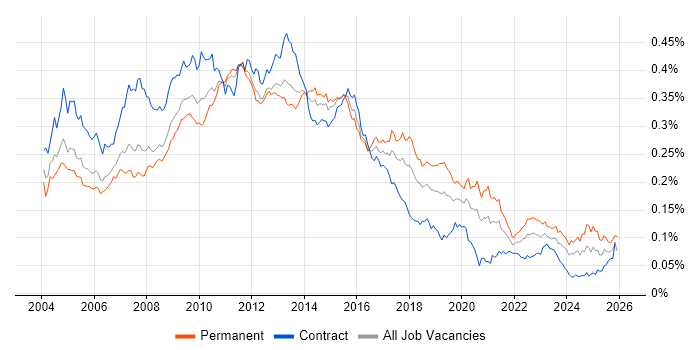Business Developer
UK
The median Business Developer salary in the UK is £50,000 per year, according to job vacancies posted during the 6 months leading to 8 June 2025.
The table below provides salary benchmarking and summary statistics, comparing them to the same period in the previous two years.
| 6 months to 8 Jun 2025 |
Same period 2024 | Same period 2023 | |
|---|---|---|---|
| Rank | 670 | 810 | 847 |
| Rank change year-on-year | +140 | +37 | +270 |
| Permanent jobs requiring a Business Developer | 47 | 94 | 97 |
| As % of all permanent jobs advertised in the UK | 0.083% | 0.087% | 0.10% |
| As % of the Job Titles category | 0.092% | 0.092% | 0.11% |
| Number of salaries quoted | 41 | 79 | 71 |
| 10th Percentile | £42,500 | £32,850 | £32,500 |
| 25th Percentile | £44,000 | £35,625 | £41,830 |
| Median annual salary (50th Percentile) | £50,000 | £52,500 | £57,500 |
| Median % change year-on-year | -4.76% | -8.70% | +9.52% |
| 75th Percentile | £67,500 | £63,750 | £74,375 |
| 90th Percentile | £70,000 | £75,750 | £85,000 |
| UK excluding London median annual salary | £45,000 | £45,000 | £42,500 |
| % change year-on-year | - | +5.88% | -5.56% |
All Permanent IT Job Vacancies
UK
For comparison with the information above, the following table provides summary statistics for all permanent IT job vacancies. Most job vacancies include a discernible job title that can be normalized. As such, the figures in the second row provide an indication of the number of permanent jobs in our overall sample.
| Permanent vacancies in the UK with a recognized job title | 50,995 | 102,425 | 85,502 |
| % of permanent jobs with a recognized job title | 90.36% | 94.93% | 91.23% |
| Number of salaries quoted | 26,845 | 72,430 | 55,393 |
| 10th Percentile | £28,500 | £28,500 | £32,500 |
| 25th Percentile | £40,000 | £38,565 | £45,000 |
| Median annual salary (50th Percentile) | £55,000 | £52,500 | £60,000 |
| Median % change year-on-year | +4.76% | -12.50% | - |
| 75th Percentile | £73,708 | £70,000 | £80,000 |
| 90th Percentile | £95,000 | £90,000 | £100,000 |
| UK excluding London median annual salary | £50,600 | £50,000 | £53,500 |
| % change year-on-year | +1.20% | -6.54% | +5.94% |
Business Developer
Job Vacancy Trend
Job postings that featured Business Developer in the job title as a proportion of all IT jobs advertised.

Business Developer
Salary Trend
3-month moving average salary quoted in jobs citing Business Developer.
Business Developer
Salary Histogram
Salary distribution for jobs citing Business Developer over the 6 months to 8 June 2025.
Business Developer
Top 12 Job Locations
The table below looks at the demand and provides a guide to the median salaries quoted in IT jobs citing Business Developer within the UK over the 6 months to 8 June 2025. The 'Rank Change' column provides an indication of the change in demand within each location based on the same 6 month period last year.
| Location | Rank Change on Same Period Last Year |
Matching Permanent IT Job Ads |
Median Salary Past 6 Months |
Median Salary % Change on Same Period Last Year |
Live Jobs |
|---|---|---|---|---|---|
| England | +103 | 40 | £49,500 | -4.96% | 71 |
| UK excluding London | +139 | 25 | £45,000 | - | 52 |
| Work from Home | +122 | 22 | £45,000 | -21.74% | 54 |
| London | +112 | 18 | £65,000 | +4.00% | 31 |
| Midlands | +63 | 11 | £45,000 | - | 11 |
| West Midlands | +62 | 11 | £45,000 | -11.76% | 4 |
| North of England | +29 | 5 | £46,250 | -11.20% | 9 |
| South East | +102 | 3 | £50,000 | - | 19 |
| South West | +96 | 3 | £52,500 | +50.00% | 1 |
| Yorkshire | +54 | 3 | £49,000 | +22.50% | 1 |
| Scotland | - | 3 | £50,000 | - | 8 |
| North West | -18 | 2 | £43,500 | -20.91% | 7 |
Business Developer Skill Set
Top 30 Co-occurring Skills and Capabilities
For the 6 months to 8 June 2025, Business Developer job roles required the following skills and capabilities in order of popularity. The figures indicate the absolute number co-occurrences and as a proportion of all permanent job ads featuring Business Developer in the job title.
|
|
Business Developer Skill Set
Co-occurring Skills and Capabilities by Category
The follow tables expand on the table above by listing co-occurrences grouped by category. The same employment type, locality and period is covered with up to 20 co-occurrences shown in each of the following categories:
|
|
|||||||||||||||||||||||||||||||||||||||||||||||||||||||||||||||||||||||||||||||||||||||
|
|
|||||||||||||||||||||||||||||||||||||||||||||||||||||||||||||||||||||||||||||||||||||||
|
|
|||||||||||||||||||||||||||||||||||||||||||||||||||||||||||||||||||||||||||||||||||||||
|
|
|||||||||||||||||||||||||||||||||||||||||||||||||||||||||||||||||||||||||||||||||||||||
|
|
|||||||||||||||||||||||||||||||||||||||||||||||||||||||||||||||||||||||||||||||||||||||
|
|
|||||||||||||||||||||||||||||||||||||||||||||||||||||||||||||||||||||||||||||||||||||||
|
|
|||||||||||||||||||||||||||||||||||||||||||||||||||||||||||||||||||||||||||||||||||||||
